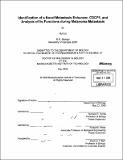Identification of a novel metastasis enhancer, CDCP1, and analysis of its functions during melanoma metastasis
Author(s)
Liu, Hui
DownloadFull printable version (28.98Mb)
Other Contributors
Massachusetts Institute of Technology. Dept. of Biology.
Advisor
Richard O. Hynes and Forest M. White.
Terms of use
Metadata
Show full item recordAbstract
Nearly 90% of cancer mortality from solid tumors is due to metastasis of malignant cells to the distant vital organs. It is now well established that a plethora of stromal cells are present within the tumor, and contribute in various ways to tumor initiation and progression, and plasma membrane proteins are the mediators for tumor-stromal communications. In this thesis, I focused on plasma membrane proteins that may contribute to tumor metastasis. I applied quantitative mass spectrometry technology to first identify plasma proteins that are expressed at different levels in melanoma cells with high versus low metastatic abilities. Using SILAC (stable isotope labeling with amino acids in culture) coupled with nano-spray tandem mass spectrometry, this work led to the discovery of C̲ub Ḏomain C̲ontaining Protein 1 (CDCP1) as one of those differentially expressed transmembrane proteins. We found that CDCP1 is not only a surface marker for cells with higher metastatic potential, it is also functionally engaged in enhancing tumor metastasis. When searching for the underlying mechanisms, we found that CDCP1 is important for soft agar colony-forming abilities, suggesting that CDCP1 might regulate the balance between cell proliferation and anoikis. Making use of 3D Matrigel culture system, we found that CDCP1 also regulates scattered growth of melanoma cells. We speculate these two factors may contribute to enhanced-metastatic ability observed in mice. (cont.) When investigating signaling pathways that may mediate the functions of CDCP1, we found that overexpression of CDCP1 correlates with hyper-activation of Src family kinases. While wild-type CDCP1 enhances SFK activation, point mutation that abolished CDCP1 functions (in scattered growth and in metastasis) also abolished SFK hyper-activation, suggesting that CDCP1 might function through the activation of SFKs. Such notion was further supported since pharmacological reagents PP2 and Dasatinib, which are two SFK inhibitors, blocked in vitro functions of CDCP1 in scattered growth. Thus the work in this thesis has identified a novel metastasis enhancer, CDCP1, and has gained insight into the mechanisms by which CDCP1 functions.
Description
Thesis (Ph. D.)--Massachusetts Institute of Technology, Dept. of Biology, 2009. Includes bibliographical references.
Date issued
2009Department
Massachusetts Institute of Technology. Department of BiologyPublisher
Massachusetts Institute of Technology
Keywords
Biology.